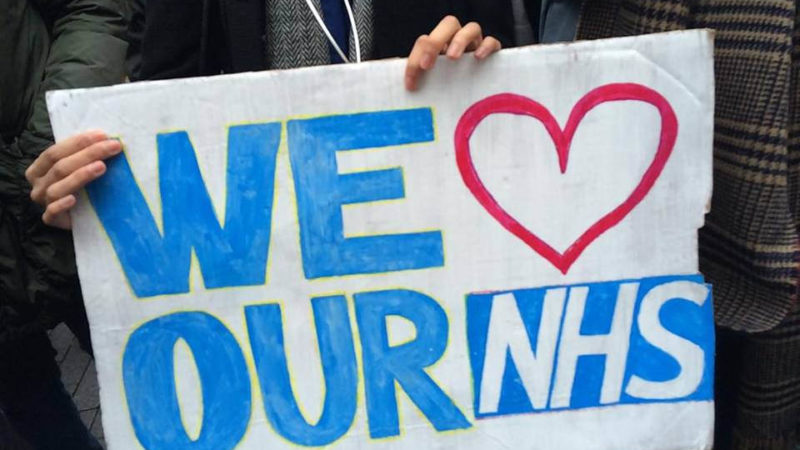Fewer referrals from NHS hospitals to private ones is generally good news. But we should keep vigilant, National Health Action Party's Kane Shaw argues.

It seems that not a day goes by where you don’t read a story of how the private sector has managed to amass vast amounts of money from the health service while also managing to undermine its performance.
But today it appears that the saying of “what goes around comes around” has indeed come around.
The Financial Times has reported that private hospitals are struggling financially as NHS Trusts are reducing referrals to them. This is a cause for celebration, but could also be a cause for concern.
Private hospitals pose a serious risk to patient safety. Research shows 2 out of 5 private hospitals do not comply with UK and international safety standards. Even Jeremy Hunt – an odious individual who treated the NHS with nothing but contempt – told private hospitals to get their house in order.
The relationship that has taken hold between private hospitals and the NHS has been nothing short of exploitative.
The Centre for Health and the Public Interest, has pointed out that half of inpatients in private hospitals are NHS referrals, and a third of outpatients are NHS referrals. To be clear, patients aren’t referred to private hospitals because they possess greater clinical prowess. It’s because the increasing demand placed on the NHS coupled with the longest spending squeeze in its 70-year history has forced it to refer patients for private treatment – paid for by the NHS – to avoid sanctions for missing referral waiting time targets.
But making the NHS reliant on private healthcare providers operating to an entirely different logic was always going to end in tears – and it has.
For a start, private hospitals refused to invest in facilities for patients experiencing post-operative complications. Instead they’ve been sending patients back to NHS A&Es. Leaving the public and an already struggling NHS to pick up the bill.
This means paramedics have to collect the patient from the hospital, which puts them at further risk. This has led to 104 deaths. That is 104 people who are no longer alive because private hospitals use the NHS to keep down their costs. It is estimated that these hospitals have cost the NHS in excess of £250m as a result of this practice.
The majority of private hospitals also breach EU law and Royal College of Surgeons standards by having a single Junior Doctor work an average week of 162 hours attending on average to 32 patients. This has also led to deaths.
Private hospitals also refuse to directly employ clinical staff.
Instead they offer NHS practitioners what are known as “practicing privileges”. These allow surgeons and other staff to practice at the hospital. This means that a consultant can be registered at a hospital, have undertaken a single operation there 5 years ago but still be able, without any checks, to operate there tomorrow should they wish to. One private hospital, the Harley Street Clinic, has 868 registered consultants despite only having 100 beds.
The reason private hospitals do this is so that in the event of clinical malpractice or an accident, they can claim that the NHS is responsible as they trusted the NHS’s own vetting procedures when they gave privileges to a doctor.
This tactic was used in the wake of the Ian Paterson scandal that saw 750 women mutilated at the hands of a doctor working in a private hospital. In this case the private hospital went a step further and sought to sue the NHS. This is despite later having to admit that their governance structures were poor.
We should rejoice that the NHS is slowly becoming less reliant on having to feed these parasitical hospitals which have placed such a strain on the NHS and endangered patient safety. But we also have to be vigilant.
The reason for the reduction in referrals is due to the removal of sanctions for breaching waiting times.
We must ensure that this doesn’t led to a slow but steady decline in NHS performance. NHS hospitals must be given the resources they need to provide timely care for patients. Spending this money in the NHS rather than in the private sector will be good for patients and good for the NHS.
Kane Shaw is Press Officer to the National Health Action Party.
Left Foot Forward doesn't have the backing of big business or billionaires. We rely on the kind and generous support of ordinary people like you.
You can support hard-hitting journalism that holds the right to account, provides a forum for debate among progressives, and covers the stories the rest of the media ignore. Donate today.




One Response to “The NHS is referring fewer patients to private hospitals – good riddance”
Frances Bell
That’s all credible and disturbing news. But I know several people with “top” jobs who plain cannot dismantle their timetables and find replacements, let alone the stress of waiting for the operation. I lost everything: my job because there wasn’t an easy way to replace my programme over a few months, my visits to family (more than a day away) and a lot of money as holidays in the uk were cancelled.I was told the reason for refusing my referral were that if anything went wrong in the private hospital , the rules are that the NHS is not allowed to sort me out. I know that’s not true – I have researched the legal documents – or at least, any rule is ignored.